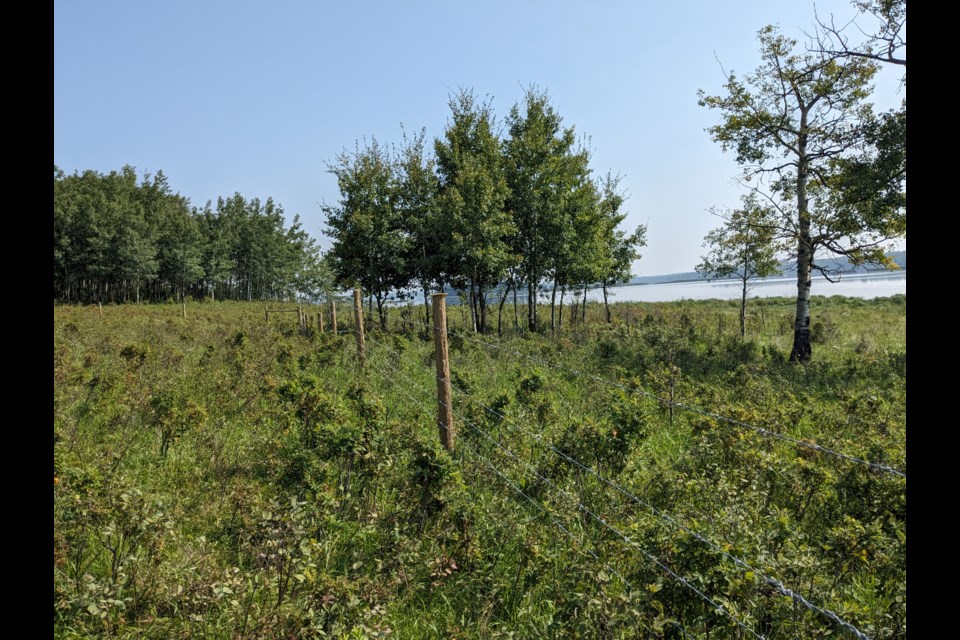BARRHEAD – Alternative Land Use Services (ALUS) has 54 projects completed, including almost 700 acres and there are 638 acres enrolled with another 65 projects planned.
Barrhead, Westlock and Athabasca joined ALUS in 2021 and started getting projects on the ground in 2022.
Lisa Card is the ALUS representative for Barrhead, Westlock and Athabasca, also supporting the Thorhild area.
“ALUS is very much a farmer led, farmer delivered, and farmer focused type program,” said Card.
The projects are a 50/50 cost share between the program and the producers.
Producers are given an annual payment based on the size of the project.
For example, if a shelterbelt goes in on croplands, the annual payment made each December is $50 an acre from that project.
Brazeau County is celebrating ten years with ALUS. Their producers who have completed projects have been receiving annual payments for up to 10 years.
Payments are based on the size of acres and what the land was used for.
Initial contracts are set for five years with the opportunity to renew, and projects are reviewed yearly to ensure maintenance has been kept up.
In the shelterbelt example there is more advantage in cost savings in tree purchases.
The program is offered to agriculture producers with no specific limits in the size of the farm or the revenue amounts produced by the farm.
Even the definition of farming is ‘pretty variable,’ said Card.
One of the best parts is that enrollment is a phone call to Card. She does the paperwork for the producer.
Projects are decided by a panel of experienced farmers who have all completed a project themselves and one municipal councillor.
Some of the projects have completed fencing off creeks, rivers, and wetlands.
The objective of many projects is to keep the water clean and keep that riparian area healthy.
There have been projects to down a couple of beaver pond levelers to avoid the flooding.
ALUS has supported a large amount of wildlife plantings.
They focus on areas near water bodies or planting but sometimes those objectives overlap. For example, the project can include fencing off wetland and planting trees.
ALUS purchases the trees and passes the savings on to producers at cost which can equate to a tenth of retail prices.
Many people are interested in planting pollinators and ALUS provides saskatoons, chokecherries and highbush cranberries.
There is a special machine that is provided for use as part of an approved project that makes it easy for them to put in plastic mulch around seedlings. It lifts dirt on either side of where the tree planting is designated producing a straight line of black plastic.
This helps the trees start growing earlier in the spring, keeps more moisture in the ground and keeps the weeds away.
A new plastic mulch applicator was acquired by ALUS this year.
There is the opportunity to put up bird houses and bat houses as part of the projects.
Card said the little things like that make a big difference. Just to add a couple of birdhouses along those fence posts makes the project better.
The national ALUS program is a charity, and they provide funding along with private donations. Cargill and The Western Foundation support ALUS.
Unfortunately, ALUS can't work with acreage owners.
If producers are looking to fence off a dugout that would not fall within the objectives of ALUS because they focus on natural water bodies.
Interested farmers can contact Card at 780-674-8069 or email her at [email protected]. She will schedule a meeting and come out to discuss the project, sign the paperwork and review the do's and don’ts guides.
Photos of the site are taken to assess what exists today and Card will work with the producer to figure out where they want to fence or the nature of their project.
Card puts together the project proposal, working with the producer to make sure what goes before the committee is what the producer wants.
There is an Aug. 31 deadline to be considered for 2026 projects, but Card is open to discussing projects at any time during the year.



